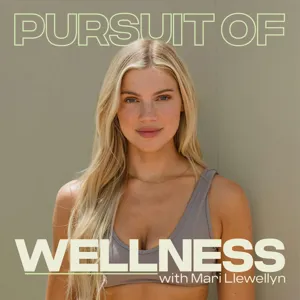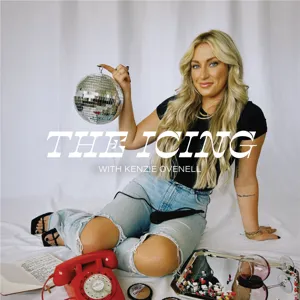Podcast Summary
Protecting Teeth and Finances in Your 20s: Use toothpaste and mouthwash for enamel repair, seek financial therapy for emotional support, save money with smart shopping, and utilize efficient tools for work tasks.
Taking care of our teeth and finances are essential aspects of our overall well-being during our 20s. For teeth, using products like Pronamel's intensive enamel repair toothpaste and mouthwash can help protect and repair acid-weakened enamel. For finances, having a professional like Lindsay, a financial therapist, can help individuals navigate the emotional side of money and manage financial anxiety. Both Pronamel and financial therapy offer effective solutions to common issues in our 20s, ensuring a healthier future. Additionally, smart shopping choices, such as Kroger brand products, can help save money while providing proven quality. Lastly, tools like Canva presentations can make work tasks, like creating presentations, more efficient and effective. Overall, taking care of our teeth, finances, and utilizing helpful resources can make a significant difference in our lives during our 20s.
The Emotional Impact of Financial Struggles: Financial stress can lead to guilt, anxiety, and shame. Adequate compensation and addressing the emotional side of money is crucial for overall well-being.
Financial struggles can have far-reaching emotional consequences. The speaker, who became a financial therapist unintentionally, shared her personal experience of feeling guilty and anxious despite having graduated from university without debt. She found that following personal finance advice didn't solve her problems and instead led to feelings of shame. When she eventually got a better-paying job, she noticed that her mental health improved, highlighting the connection between financial stress and emotional well-being. The speaker emphasizes that under-earning is a common issue in helping professions and that addressing the emotional side of money is crucial. In summary, the emotional impact of financial stress should not be overlooked, and adequate compensation for work is essential for overall well-being.
Understanding Financial Anxiety: Financial anxiety is a complex emotion that can't be solved with more income or savings. Seek professional help to learn healthier ways to manage money and emotions.
Financial anxiety is a common experience, especially for younger generations who are just starting their careers and dealing with rising costs of living. This anxiety can manifest physically and emotionally, leading individuals to cope through perfectionism or procrastination. It's a common misconception that earning more money or having more savings will eliminate financial anxiety, as it is deeply rooted in emotions rather than logic. Therapists often help clients navigate these feelings and learn healthier ways to manage their money and relationships surrounding it.
Understanding the Roots of Financial Anxiety: Childhood experiences and lack of open communication about money can contribute to financial anxiety, leading to procrastination or perfectionism as coping mechanisms.
Both procrastination and perfectionism are socially accepted ways of dealing with money, but they can contribute to financial anxiety. These behaviors can stem from childhood experiences and can take precedence over learning to tolerate discomfort and understanding our relationship with money. Research suggests that many decisions about money are made by the time we're eight years old, and lack of open communication about money from caregivers can impact our understanding of it. The physical sensation of anxiety can lead us to compensate with perfectionism or procrastination, but it's important to consider the effort required to avoid financial anxiety versus learning to tolerate it. By acknowledging the prevalence of financial anxiety and seeking resources, we can begin to challenge these behaviors and work towards a healthier relationship with money.
Childhood experiences shape adult financial behaviors: Recognize the difference between childhood experiences and present financial situation, use logic and compassion to help young adults cope with financial struggles, and promote societal change for financial literacy and reducing stigma.
Our childhood experiences and financial messages we received from our caregivers can significantly impact our financial behaviors and anxiety as adults. For those who grew up in financially struggling households, they may internalize the message to work hard and save rigorously to avoid hardship. However, this coping mechanism can lead to perfectionism and overworking, distracting from emotional experiences. To help young adults dealing with this, it's essential to recognize the difference between their present financial situation and their childhood experiences, using logic and compassion. On a larger scale, societal change is needed to normalize open discussions around money and reduce the financial gap between individuals, promoting financial literacy and reducing the stigma around seeking help for financial struggles.
Strong social safety nets improve mental health during financial instability: Advocating for policies like paid leave, affordable childcare, and social security benefits can improve mental health and overall wellbeing, especially during economic downturns. Communication and support in relationships also contribute to emotional and psychological stability.
Having a strong social safety net is crucial for individuals' mental health and wellbeing. During times of financial instability, such as the Great Recession, research from the World Health Organization shows that countries with stronger social safety nets had less impact on people's mental health. Therefore, advocating for policies like paid maternity and paternity leave, affordable childcare, and adequate social security benefits can significantly improve people's mood and overall wellbeing. This is especially important for young people, as they continue to advocate for these policies not just for themselves but for the collective mental health of their communities and countries. When it comes to managing money in relationships, it's essential to communicate openly about financial situations and find ways to support each other, rather than ghosting friends or partners due to financial differences. By working together and having a strong social safety net in place, individuals can build a solid emotional and psychological foundation for their financial future.
Honest communication is crucial for healthy friendships: Be open about financial limitations, suggest low-cost activities, and communicate financial priorities to maintain strong friendships
Honest communication is key in maintaining healthy friendships. It's understandable to feel uncomfortable discussing financial limitations, but ghosting or canceling plans at the last minute can lead to misunderstandings and damaged relationships. Instead, having an open and transparent conversation with your closest friends about your financial situation and suggesting alternative, low-cost activities can lead to a better understanding and appreciation of each other's circumstances. This not only helps to avoid misunderstandings but also strengthens the bond between friends. Additionally, be aware of the pressure to keep up with lifestyle inflation as you earn more money. This phenomenon can lead to unnecessary spending and financial strain. To avoid this, it's important to be mindful of your financial priorities and communicate them to your friends. Remember, the quality of your friendships should not be determined by your ability to keep up with expensive activities.
Understanding Lifestyle Inflation and its Impact on Happiness: Be mindful of peer pressure and surroundings that may lead to unnecessary spending. Prioritize purchases based on personal values to ensure long-term happiness and live an intentional life.
Our surroundings and peer groups can influence our spending habits, leading to lifestyle inflation or "creep." This can result in purchases that may not align with our values and ultimately bring us happiness. It's essential to perform a "loving audit" of our spending to identify and prioritize purchases that matter most to us. By doing so, we can make conscious decisions that align with our values and bring long-term joy. Additionally, social and group pressures can contribute to this phenomenon, making it crucial to be aware of these influences and resist the urge to overspend to fit in. Remember, it's not about cutting everything but rather cutting the things that don't matter to us. By focusing on what truly matters, we can make the most of our hard-earned money and live a more intentional and fulfilling life.
Discussing finances with your partner: Having an open and regular conversation about finances can lead to increased happiness and better alignment in relationships. Approach the conversation neutrally and focus on a few topics, building in regular 'money dates' for ongoing discussions.
Open communication about money is crucial for couples who live together, whether engaged or not. Having a conversation about finances before moving in together or during a life change can lead to increased happiness and better alignment in the relationship. It's essential to approach the conversation neutrally and at a convenient time, giving your partner a heads-up to prepare. During the conversation, focus on a few topics and build in regular "money dates" to discuss finances regularly but not constantly. Remember, talking about money doesn't have to be a source of conflict; instead, it can bring couples closer and foster a stronger partnership.
Communicating about money in relationships: Approach money talks with care, clear parameters, openness, and a compromise-focused mindset to maintain healthy relationships.
Effective communication and financial management are crucial in maintaining a healthy relationship. When it comes to discussing sensitive topics like money, it's essential to approach the conversation with care and consideration. Establishing clear parameters, such as setting aside specific times for discussions and acknowledging emotional dysregulation, can help prevent misunderstandings and conflicts. A practical solution for managing shared expenses is implementing a "theirs, mine, and ours" bank account system, where each partner maintains their individual funds while contributing to a shared account for joint expenses. It's also vital to have open and honest conversations about financial responsibilities and goals, as well as being comfortable with your partner's spending decisions. Overall, the key is to approach these discussions with vulnerability, respect, and a willingness to find a compromise that works for both partners.
It's normal to make mistakes with money: Extend yourself compassion, understand money is a journey, and consider seeking help from resources like Mind, Money, Balance and Lindsay Bryan-Podvin's book 'The Financial Anxiety Solution'.
It's normal and expected to make mistakes when it comes to managing money. No one is perfect, and everyone will encounter financial missteps along the way. Instead of being hard on yourself, extend yourself compassion and understand that cultivating a healthy relationship with money is a journey that requires time and effort. If you're struggling with financial anxiety or navigating finances in relationships, consider checking out Lindsay Bryan-Podvin's business, Mind, Money, Balance. She offers coaching, therapy, and speaking engagements to help individuals at the intersection of money and mental health. Her book, "The Financial Anxiety Solution," is a workbook focused on understanding your relationship with money, recognizing patterns, and learning tools to reduce anxiety. You can find Lindsay on social media platforms under the handle @MindMoneyBalance, and her book is available for purchase at local bookstores or online retailers like Amazon. Remember, it's okay to make mistakes with money, and there are resources available to help you learn and grow.
Protect your teeth with Pronamel, celebrate Black History Month, and listen to The Bright Side podcast.: Protect tooth enamel with Pronamel toothpaste and mouthwash, discover Black-led products during Walmart's Black History Month events, and enjoy conversations on culture and inspiration with The Bright Side podcast.
Protecting your teeth is essential, and Pronamel, a dentist-recommended brand, offers toothpaste and mouthwash to repair acid-weakened enamel. Meanwhile, Walmart's Black History Month event at the Flatiron Plaza in New York City and Ovation Hollywood in Los Angeles is an excellent opportunity to discover and try Black-led products, creating a new world of choice. Lastly, The Bright Side, a new daily podcast from Hello Sunshine, offers conversations about culture, trends, inspiration, and more, providing a chance for people to share their stories and advice. So, remember to protect your teeth with Pronamel, celebrate Black History Month with Walmart, and tune in to The Bright Side podcast.






